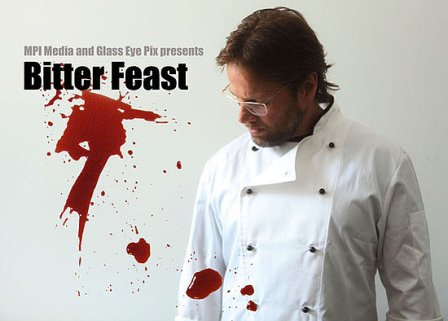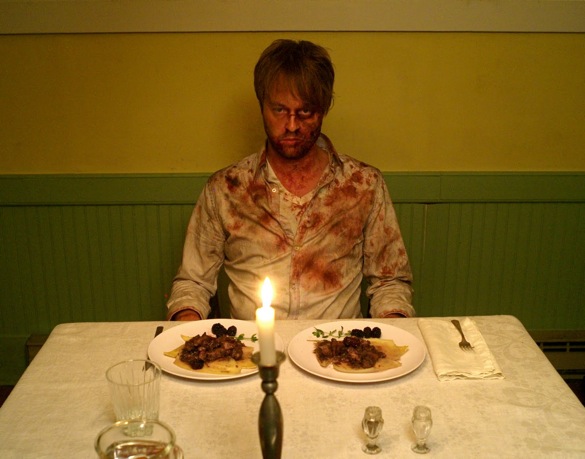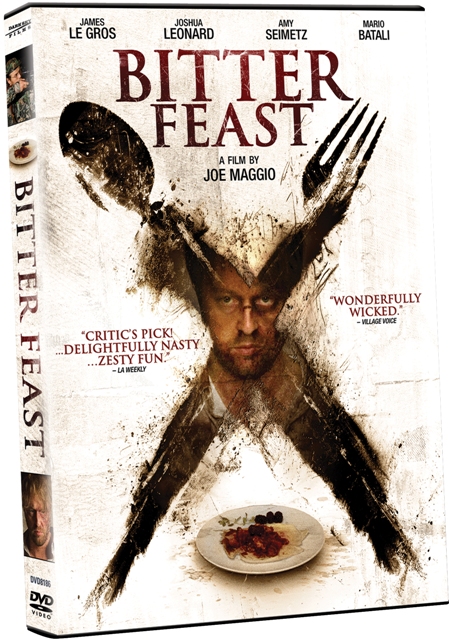CHICAGO – Patrick McDonald of HollywoodChicago.com appears on “The Morning Mess” with Dan Baker on WBGR-FM (Monroe, Wisconsin) on March 21st, 2024, reviewing the new streaming series “Manhunt” – based on the bestseller by James L. Swanson – currently streaming on Apple TV+.
Interview: Indie Filmmaker Joe Maggio Cooks Up ‘Bitter Feast’
CHICAGO – New York filmmaker Joe Maggio is fascinated by the pursuit of redemption, particularly in stories featuring characters who may not entirely be worthy of it. His 2001 debut feature “Virgil Bliss” followed a man fresh out of prison as he attempted to build a new life. Maggio’s 2008 drama “Paper Covers Rock” told the story of a suicidal mother who fights to maintain custody of her daughter.
The darkly satirical thriller “Bitter Feast” marks Maggio’s darkest tale to date. Redemption hardly seems possible for vitriolic food blogger JT Franks (Joshua Leonard), as he finds himself held hostage by Peter Gray (James LeGros), the self-righteous yet deranged celebrity chef whose restaurant he panned. Gray acquires delicious revenge by forcing Franks to cook various dishes to perfection…or else. Hollywood Chicago spoke with Maggio about his own thoughts concerning modern criticism, the advantages and disadvantages of microbudget filmmaking, and the New York Times review that inspired “Feast.”
HollywoodChicago.com: The artist/critic dynamic can be applied to any art form. What first inspired you to explore this material?
Joe Maggio: The whole artist/critic thing is not something that I think about a lot. I had been asked by Larry Fessenden’s Glass Eye Pix to come up with some kind of horror scenario, and I’m usually not a horror guy. He had money to make this movie, and I didn’t want to let the opportunity to work pass me by. So I said, “Yeah I’ve got some ideas. Let me polish a couple up and I’ll get back to you in a week.” I remembered reading a review two or three years ago in the New York Times. It was Frank Bruni reviewing Gordon Ramsay’s London hotel. It was a pretty decent review. He didn’t slam the restaurant, but he did this about face toward the end where he said, “Ultimately it lacks the most essential thing that any successful restaurant must have and that is excitement.” If you’re Gordon Ramsay, what do you do with that? It’s not like he’s saying the fish was too salty. It lacks excitement? What a vague, nebulous, damning thing to say. For New York diners at that time, Frank Bruni was so powerful. If he says it lacks excitement, people don’t want to go there, and I do think that it hurt Gordon Ramsay.
 James LeGros plays a vengeful chef in Joe Maggio’s Bitter Feast. Photo credit: MPI Home Video |
When I read that review, I thought, ‘If Gordon Ramsay was anything like his television personality, he could kill Frank Bruni for this review.’ Then I thought, ‘Wow, that would be kind of a cool setup.’ I started to think of all these nasty things he would do to [the critic]. What comes immediately to mind is physical violence against the person, and that’s not very interesting. We’ve seen that before. So I started jotting down notes of what a chef like Gordon—a keyed up, overly passionate, overly zealous chef—would do. What he would want more than anything is for the critic to understand the agony of the whole enterprise. When you start a restaurant in New York, the chances of survival are so low to begin with. A high profile chef like Gordon Ramsay has so many enemies gunning for him to fail. Then comes along an extremely powerful critic who, with one stroke of the pen, could completely sink it. Maybe Frank Bruni was having a bad day. Maybe he was sick when he went there. The smallest factors could determine whether it’s successful or not.
When I sent Glass Eye the script, they thought it was timely in light of the whole foodie culture in America. I want to make the point that I’m not some crusader for wronged chefs. I thought [the premise] was universal. Anytime someone puts themselves out there and risks something, whether it be financial or personal, there’s always someone out there risking nothing that could destroy it. I think we’re seeing a lot more of that with the Internet where people can do it rather anonymously. Anyone could do it, and that’s why I made [Franks] a blogger. These blogs are becoming incredibly powerful just by virtue of the fact that you can write anything, whether it’s factual or not, and put it out there. Even if you’re the tiniest blogger and you have very few hits, your review is right there on the web with the New York Times critic. But again, I want to make it clear that I have no axe to grind with Frank Bruni. I just thought that [the idea] was an interesting setup for a horror film.
HollywoodChicago.com: What are your own thoughts and frustrations concerning modern criticism?
Maggio: I’ve seen an evolution over the years. I think there are a lot more film critics out there who are strictly more web-based, which is fine. There’s a lot of great writing online. I’ll be honest with you, I don’t get The Times delivered to me anymore. I get everything from the web. What burns me, regardless of whether it’s a good or bad review, is factual inaccuracies that reflect a general laziness. Easily the worst review I’ve ever gotten was the New York Times review of “Bitter Feast.” We had a brief theatrical run here in New York and [the review] was factually inaccurate and full of assumptions. I feel like what we’re seeing is the worst of the web critics moving into the print stuff, probably because the people they’re hiring now at The Times got their start on the web. But that’s all conjecture.
 Joshua Leonard plays a tortured critic in Joe Maggio’s Bitter Feast. Photo credit: MPI Home Video |
There are a couple things the guy wrote that made me look like an insane, vengeful person. He said that I had such an unbalanced reaction to Frank Bruni’s review that I immediately went out and made this horrible torture film. First of all, that’s not true. He also got a plot point in the movie completely wrong. He said it was a negative review of Peter Gray’s restaurant that sinks the restaurant, when in fact [Franks] publishes the rumor that Gray’s show is going to be cancelled. The point this Times reviewer made was that no online blogger or reviewer has that kind of power, which may or may not be true. We’re seeing now that online critics are becoming more powerful, and they’re certainly powerful enough to start rumors that go off into the world and become fact.
Something else that bugs me is when critics don’t review the movie that I made. They talk about what I should have done, and spend a paragraph describing what they were expecting and anticipating. I’m like, “Dude, make a movie yourself.” Now if someone just doesn’t like the movie and picks it apart and tells why it doesn’t work, that’s fine. I love reading those kinds of reviews. You learn a lot.
HollywoodChicago.com: How closely do Peter Gray’s views about the “creator and destroyer” mirror your own?
Maggio: I take somewhat of a philosophical approach by using that William Blake poem at the beginning and having Gray quote it back to Franks at the end. It’s from “The Marriage of Heaven and Hell.” I don’t get too bent out of shape about it, but I feel it’s always been that way and it always will be. I’m sure even back in the caveman days, every time someone tried to put one rock on top of another, someone else came along and pushed it off. It’s just the way things are.
HollywoodChicago.com: Redemption is a recurring theme in your work. What attracts you to this theme?
Maggio: I don’t know really. When I was making “Virgil Bliss,” one of my big preoccupations was this idea of redemption. It was almost like a game. How bad can we make someone and still have the audience want to see them succeed? Virgil was a character who had turned to armed robbery, and beaten the owner of a liquor store so badly that he’s now living in a vegetative state. We’re aware of that fairly early on, and yet you’re still rooting for him. I felt like the movies that didn’t work for me had rigged the game. The person wasn’t really that bad, the redemption was sort of built in. It was an easy redemption. I didn’t want it to be easy, and I feel like that has informed everything I’ve done. I’ve wanted to take characters that seem beyond redemption and have them try to find their way back. In fact, the film I just finished making in Chicago, “The Last Rites of Joe May,” is very similar. It’s very much a story of redemption. Dennis Farina plays a short money hustler who’s basically wasted his life and turned his back on everyone who cared for him. He’s now at the end of his life, and the film is about whether or not he can redeem himself.

Joshua Leonard’s cooking gets a very, very bad review in Joe Maggio’s Bitter Feast.
Photo credit: MPI Home Video
HollywoodChicago.com: In the “Bitter Feast” commentary, you half-jokingly profess that you have a “dim view of humanity.” Is that true?
Maggio: I don’t think there’s anything to be gained in pretending that human beings don’t suck. We really are a pox upon the earth. However, we’re all that we have, and I do think that we’re capable of incredibly noble acts as well. That’s the human condition: we’re selfish, self-serving animals who are interested in our own survival, and yet there are also people who are incredibly altruistic. I just think that’s the way it is. You just have to keep moving on as best you can and try to do as little harm as possible, but there are people out there who suck. There’s no way around it, I’m sorry.
HollywoodChicago.com: How did you go about balancing the dark humor with the horror? I suspect that Gray’s line, “No runny yellows!” may become the next “No wire hangers!”
Maggio: Yeah, I was actually consciously trying to do that with that one. I think [“Virgil Bliss”] is hilarious. No one thought that was funny. I think there are situations in that film that are hilarious. When you take certain situations in “Bitter Feast” and play them straight, they’re so crazy that you just can’t help but laugh. I didn’t intentionally [plan] for them to be funny, but when we were shooting it, after several takes, people would just burst out laughing. We did the “no runny yellows” exchange about fifteen times, and James [LeGros] did it a different way each time. I didn’t actually consciously worry about striking any balance. I think the humor emerged organically, because we treated these crazy, outrageous situations in a very straightforward way. I love to cook, but there are times when a guest is coming over and you’re doing something you’ve never done before in the kitchen—it’s nail-biting to consider the idea that your life depends on what an egg is going to do in a hot pan.
HollywoodChicago.com: How did you narrow down your choices of food to use for the suspenseful cooking sequences?
Maggio: I did so much research and talked to so many people about what food to use. I had [Franks] making things like soufflés, and in the end, I decided that simpler was better. I wanted to find the things that any chef could do in his sleep with one hand tied behind his back and his eyes closed, which a guy like Franks could just not do, like cooking a steak perfectly medium rare. Unless you do it often, you’re lucky if it happens. It’s a very impulsive, completely subjective thing. “Medium rare” for me is not “medium rare” for my wife. It’s also hard to avoid breaking the yolk when cooking an egg over easy unless you’re working with farm fresh, organic eggs with a super-strong membrane that you can flip around. You’d understand it if Franks couldn’t execute an incredibly complex recipe. But here, he can’t even flip an egg or cook a steak.

Bitter Feast was released on DVD on Jan. 4, 2011.
Photo credit: MPI Home Video
HollywoodChicago.com: What are the benefits and drawbacks of working on a microbudget set in contrast to this production?
Maggio: I think it’s very true that there are advantages and disadvantages when working on a bigger budget. I think the advantages are production values. Brian Spears did all our makeup effects, and he’s an incredibly talented guy who brings so much value to our movie. We had Michael McDonough, who was the DP on “Winter’s Bone,” and that guy is fantastic. He had a team of people who could help him get everything just right. In “Virgil Bliss,” I would show up at a location and apart from maybe trying to block a window out with a blanket, there was very little I could do to control the environment. In a larger production, you can actually make it look the way you want it to look. You can have a vision and execute the vision, and it’s just more comfortable. You wake up and breakfast is there. You’re taken care of a bit more than on microbudget films.
I made “Paper Covers Rock” for $6,000. We’d break and I’d have to whip up lunch for the crew. I was driving the van, doing my own audio, and I love that movie. It’s as valuable to me as any other movie I’ve done. There are advantages to working on a microbudget. I like to move very quickly, I don’t like the actors to be sitting around. I like to do numerous takes that run from the very beginning of scenes through to the end. I don’t like to break it up. It’s very hard to do that in a big production. On a big production, if you want to move from one side of the street to the other, it takes an hour. There’s a whole block of trucks and generators that need to be moved. It’s maddening, and that drove me crazy. “The Last Rites of Joe May” was an even larger project than “Bitter Feast.” We didn’t steal any shots in Chicago. It’s a tough Union town and everything is done by the books. You can’t just have people walking around in the background of a shot. You need extras to populate the background. Arranging people in a way that feels natural takes forever. It’s so hard, and on a little microbudget, you don’t need to worry about getting permits and things like that. You just go out, shoot it and leave.
Moving forward, I think just by virtue of the fact that I need to support my family, I’m going to try and keep getting bigger and bigger because you make your money off projects in those situations. I would have the crew that I want, but I would keep things as small as possible. Most filmmakers I know have expressed the same [conflict]. You want to realize this very specific vision, but at the same time, you don’t want to feel encumbered. You want to feel free. That’s the constant balancing act.
 | By MATT FAGERHOLM |


